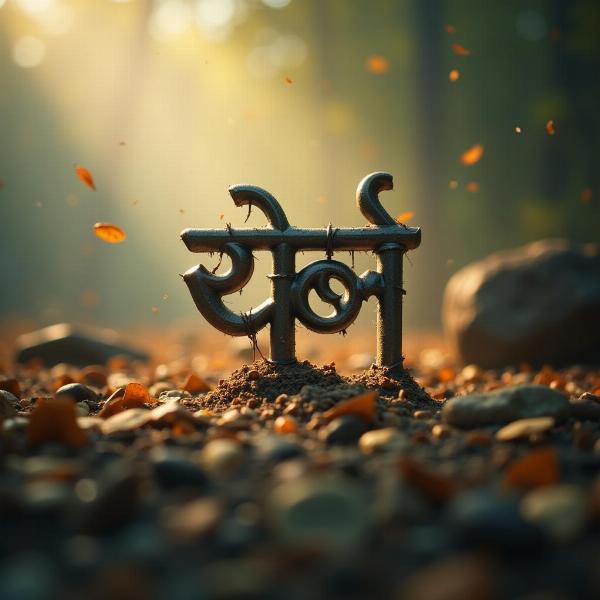Goosebumps, that tingling sensation accompanied by tiny bumps on your skin, has a profound meaning in Hindi, reflecting both physiological and cultural nuances. This article explores the various Hindi translations of “goosebumps,” their cultural significance, and the common situations that evoke this intriguing bodily reaction. Understanding the meaning of “goosebumps in Hindi” offers a fascinating glimpse into the connection between language, culture, and the human experience.
Understanding the Hindi Translations of “Goosebumps”
The most common Hindi translation for “goosebumps” is रोमांच (romāñc). This word carries a broader meaning than just the physical sensation; it encompasses the feeling of thrill, excitement, or even a sense of awe. It beautifully captures the emotional aspect associated with goosebumps, whether caused by fear, joy, or a deeply moving experience. Another translation is रोंगटे खड़े होना (roṅgṭe khaṛe honā), which literally means “hair standing on end.” This phrase focuses more on the physical manifestation of goosebumps, highlighting the involuntary reaction of the body’s hair follicles. A less common, but equally valid, translation is कँपकँपी (kaṃpakampī), which emphasizes the shivering or trembling often accompanying goosebumps, especially in colder temperatures or during intense emotional experiences.
 Hindi Word Romāñc: Exploring the Meaning of Goosebumps in Hindi
Hindi Word Romāñc: Exploring the Meaning of Goosebumps in Hindi
Cultural Significance of Goosebumps in India
In Indian culture, goosebumps are often associated with spiritual experiences. They can be seen as a sign of divine presence or a connection to a higher power. For instance, devotees might experience goosebumps during religious ceremonies, while listening to devotional music, or when witnessing acts of selfless service. This association adds another layer of meaning to the Hindi translations of “goosebumps,” connecting them to the realm of the sacred. It’s not uncommon to hear someone say “मुझे रोमांच हो रहा है (mujhe romāñc ho rahā hai),” meaning “I’m getting goosebumps,” in a context that suggests a spiritual or deeply emotional experience.
Common Situations that Evoke Goosebumps
Goosebumps aren’t exclusive to spiritual experiences; they can be triggered by a wide range of situations. Fear, excitement, cold temperatures, and even listening to inspiring music can all cause this fascinating bodily reaction. Think about the thrill of watching a captivating performance, the chills you get when listening to a powerful piece of music, or the fear you experience when watching a suspenseful movie. All these situations can evoke goosebumps, demonstrating the interconnectedness of our physical and emotional responses.
What Does it Mean When You Get Goosebumps Randomly?
Sometimes, you might get goosebumps seemingly out of the blue. While often attributed to a sudden change in temperature, random goosebumps can also be linked to underlying emotional or psychological factors. It could be your body’s way of processing suppressed emotions, or even a subconscious reaction to a memory or thought.
Goosebumps and the Power of Music
Music has a unique ability to evoke powerful emotional responses, including goosebumps. The combination of melody, harmony, and rhythm can tap into deep-seated emotions, triggering a physiological response. This is particularly true in Indian classical music, where the intricate ragas and talas are known to evoke a range of emotions, often leading to the experience of “रोमांच (romāñc).”
Conclusion
“Goosebumps in Hindi meaning” encompasses more than just a physical sensation. The Hindi translations, like “रोमांच (romāñc)” and “रोंगटे खड़े होना (roṅgṭe khaṛe honā),” reflect the cultural and emotional significance attached to this experience. Whether it’s a spiritual awakening, the thrill of a performance, or the chill of a cold night, goosebumps remind us of the intricate connection between our bodies, minds, and the world around us.
FAQ
-
What is the most common Hindi word for goosebumps? The most common Hindi word for goosebumps is रोमांच (romāñc).
-
What does रोमांच (romāñc) mean besides goosebumps? Romāñc also means thrill, excitement, or a sense of awe.
-
Is there a Hindi phrase that describes the physical sensation of goosebumps? Yes, रोंगटे खड़े होना (roṅgṭe khaṛe honā) literally means “hair standing on end.”
-
Are goosebumps considered significant in Indian culture? Yes, goosebumps are often associated with spiritual experiences and a connection to a higher power.
-
What are some common situations that cause goosebumps? Fear, excitement, cold temperatures, and music can all cause goosebumps.
Meaning-Hindi.in is your trusted partner for high-quality Hindi translation services. We offer a wide range of specialized translation solutions, from business and legal documents to technical manuals and website localization. Our team of experienced linguists ensures accuracy, cultural sensitivity, and timely delivery. For all your Hindi translation needs, contact us at [email protected] or call us at +91 11-4502-7584. Meaning-Hindi.in is committed to bridging the language gap and facilitating clear communication across cultures.